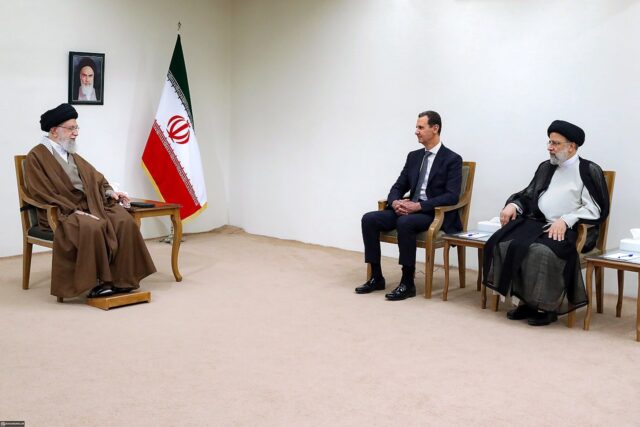Exploring Iran’s Role in Syrian Defence Industry and its Geopolitical Ramifications

Geopolitical Report ISSN 2785-2598 Volume 33 Issue 2
Authors: Silvia Boltuc
The developing geopolitical dynamics in the Middle East, particularly concerning Iran’ strategy and cooperation with Syria in the defence and military weapons sectors, have sparked significant shifts on the regional chessboard.
A few months ago, Iranian officials stated Tehran’s commitment to military support Damascus by providing an air-defence system. In the last few days, an Israeli research underlined Tehran’s possible involvement in Syrian weapon industry.
Through this report, we aim to delve deep into the motivations that drive Iran’s participation in the Syrian defence industry, and the potential consequences of this participation for the Levant geopolitical chessboard in the future.
Information Background
On May 29th, 2023, the Fars new agency published an article which highlighted Tehran’s efforts to enhance the military capabilities of Syrian President Bashar al-Assad by bolstering the nation’s air-defence system. As General Said Hamzah Kalandari stated in his interview published by the Iranian news agency, although Syria has its own air-defence capabilities, Tehran desires to provide Damascus with strategic equipment and tactical enhancements, with the primary aim to fortify defences against Israeli incursions.
On August 2nd, 2023, the ALMA Research and Education Centre, a non-profit organisation whose research team live in Israel’s northern border communities, published a report, which highlighted Iran’s strategic engagement within Syria’s defence industry.
Sarit Zehavi, the President of the Alma Research and Education Centre and a former officer in the IDF Intelligence Directorate, expounded on the findings, affirming the report’s demonstration of Iranian involvement within a specific Syrian governmental agency focused on the development of weaponry.
Iran-Syria Cooperation in Defence Industry: Why Does It Matter?
The potential connection between Iran and the Syrian weapon sector may emphasise that industry relocation could have been a significant motivator for Tehran to enhance the defence alliance with Damascus. Despite Iran’s efforts to secure its internal infrastructure, it has been subjected to attacks in recent years. Moving the industry to other countries and create a network can make it difficult for Iran’s enemies to control its activities across multiple states.
In addition to this, it is important to note that Israel has been expanding its presence in countries such as Azerbaijan, intending to gain direct access to Iran. In response, Tehran has been increasing its influence on both Syria and Lebanon as a countermeasure.
Israel engaged for years in the bombing of Hezbollah arms depots and their means of transport. For this reason, Iran having its own production in Syria with its Islamic Guard in charge of the local military industry production is a big strategic advantage.
On the one hand, Syria benefits from working closely with Iran’s industry and scientists, which certainly further strengthens their alliance. On the other hand, there is a limit to how much this cooperation can increase, and the interests of the other actors involved in Syria give this limit, among the most important we can certainly mention Russia.
Furthermore, many regional actors possess nuclear weapons. Saddam Hussein’s attack towards Iran with the support of a large part of the West is still a painful memory for Iran. Therefore, for Tehran, catching up with the armaments in possession of its neighbours is a deterrent strategy for its own security. This also applies to non-nuclear weapons: for instance, recently Turkey has inaugurated the production of its most lethal drones in Azerbaijan, an action which Tehran perceives as a dangerous threat.
The Middle East: A Geopolitical Scenario
The Middle East’s traditional instability has seen a transformation because of renewed optimism driven by various geopolitical shifts. China’s involvement in fostering diplomatic ties between Saudi Arabia and Iran and Riyadh’s subsequent rapprochement with Syria signal a reconfiguration of the regional chessboard.
Syria’s Foreign Minister Faisal Mekdad has expressed a desire to rebuild ties with neighbouring states, exploiting the current openness to international cooperation. Although challenges persist, including Syria’s closeness to Russia and historical tensions with Saudi Arabia, external powers like Beijing and Moscow are pushing for a new geopolitical landscape.
Saudi Arabia’s role is pivotal, as it seeks to create opportunities in the wake of changing dynamics, facilitated by the easing of tensions between Riyadh and Tehran. The conflict in Yemen, a point of contention in Saudi-Iran relations, has seen progress towards peace. The United Nations views this juncture as crucial, suggesting that Yemen is experiencing a relative calm that could lead to conflict resolution.
Syria’s reintegration into the Arab League is a significant development. While some countries remain hesitant, Saudi Arabia’s efforts to mediate and support Syria’s return show broader shifts in the Middle East. Qatar’s opposition contrasts with Saudi and Turkish support, especially for Ankara, whose domestic politics has been influenced by both the earthquake and the evolving geopolitical dynamics. Iran’s involvement in fostering regional changes is highlighted, underscoring the complexity of the reconfiguration.
Conclusion
Iran’s strategy and collaboration with Syria have far-reaching implications for the Middle East’s geopolitical landscape. Tehran’s objectives, including safeguarding sensitive infrastructure and expanding influence, drive its involvement in Syria’s weapon development centres. The land corridor, which has been shortened for supplying Hezbollah, presents several strategic advantages, but it also has its fair share of challenges.
Broader regional consequences include Yemen’s peace prospects, Russia and China’s increasing roles, and the reshaping of alliances in the Middle East. The developing situation underscores the importance of regional cooperation, changing alliances, and the potential for a transformed geopolitical chessboard.
Do you like SpecialEurasia reports and analyses? Has our groundbreaking research empowered you or your team? Now is your chance to be a part of our mission! Join us in advancing independent reporting and unlocking the secrets of Eurasia’s complex geopolitical landscape. Whether through a one-time contribution or a monthly/yearly donation, your support will fuel our relentless pursuit of knowledge and understanding. Together, let’s pave the way for a brighter future. DONATE NOW and secure your place in shaping the geopolitical narrative.
